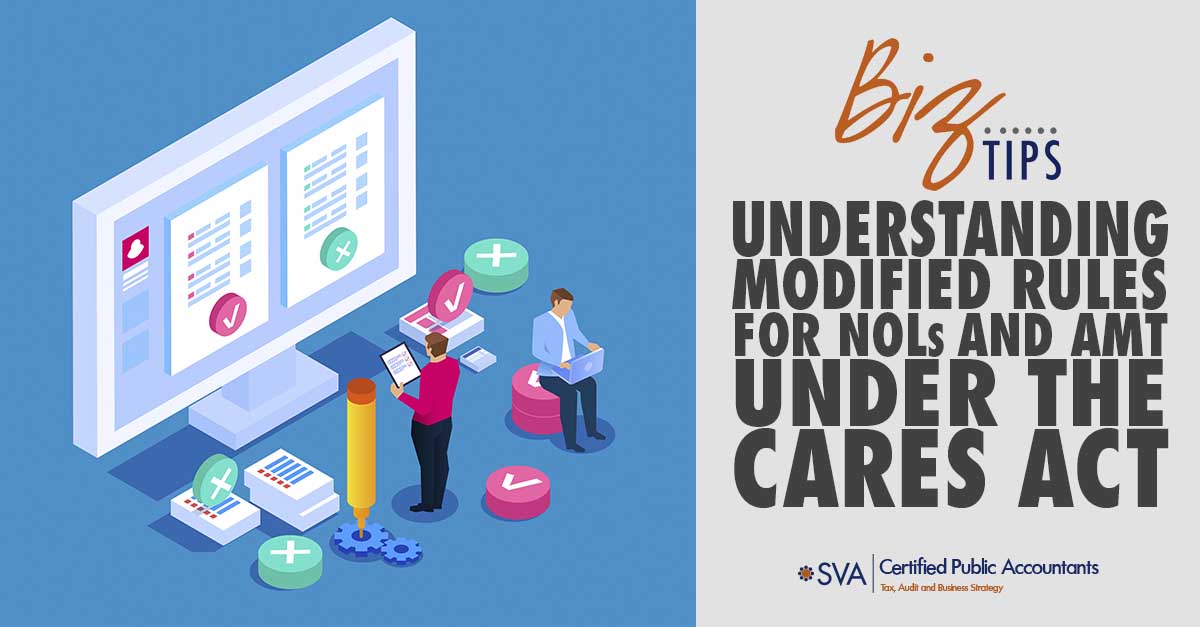The Coronavirus Aid, Relief, and Economic Security Act (“CARES Act”) was signed into law by President Trump on March 27, 2020, includes measures designed to deliver economic and fiscal relief to businesses large and small, as well as individuals facing financial difficulties due to the coronavirus (COVID-19) crisis.
Notable among significant business tax provisions of the CARES Act, it:
- Eliminates the taxable income limit for certain net operating losses (NOL);
- Allows businesses and individuals to carryback NOLs arising in 2018, 2019 and 2020 to the five prior tax years;
- Suspends the excess business loss rules related to pass-through entity owners;
- Accelerates the refunds of previously generated corporate alternative minimum tax (AMT) credits;
- Modifies the business interest limitation under section 163(j) from 30 percent to 50 percent (special partnership rules apply);
- And fixes the “retail glitch” for qualified improvement property (QIP) as defined in the Tax Cuts and Jobs Act (TCJA), which was passed in 2017.
NOL Modifications
The CARES Act amends the Internal Revenue Provisions to allow for the carryback of losses arising in taxable years beginning after December 31, 2017, and before January 1, 2021, to each of the five taxable years preceding the taxable year of such loss. (The CARES Act does not alter the indefinite carryforward of NOLs).
The CARES Act also amends the limitation that NOLs could be used to offset no more than 80% of taxable income (disregarding the NOL deduction itself). The amendment applies to tax years beginning before January 1, 2021 (previously, tax years beginning after December 31, 2017, were subject to the 80% limitation utilization pertaining to certain NOLs).
Technical Amendments Related to Fiscal Year NOLs
The CARES Act amends NOL carryback rules related to fiscal year taxpayers with taxable years that began in 2017 and ended during 2018. The amended rules now state that an NOL arising during the 2018 fiscal year is available for carryback for a two-year period, which was the rule in effect before the TCJA amendment.
Modification of Corporation AMT Credits
The corporate alternative minimum tax (AMT) was repealed as part of the TCJA. Any remaining corporate AMT credits were made available as refundable credits for years ending in 2018 to 2021. The CARES Act accelerates the ability of companies to recover those AMT credits, permitting companies to claim full refunds starting in 2018 and /or 2019 in order to access additional cash flow during the COVID-19 emergency.
Note: This may present a refund opportunity to amend 2018 returns.
Modification of Limitation on Business Interest
The CARES Act increases the 30 percent adjusted taxable income threshold to 50 percent for taxable years beginning in 2019 and 2020. In addition, the CARES Act allows taxpayers to elect to use their 2019 adjusted taxable income as their adjusted taxable income in 2020.
Qualified Improvement Property
The CARES Act corrected an error in the TCJA related to the life of “qualified improvement property” (QIP). QIP is defined as, “any improvement made by the taxpayer to an interior portion of a building which is nonresidential real property if such improvement is placed in service after the date such building was first placed in service.” This property will now be classified as “15-year property” and eligible for bonus depreciation. These technical amendments are retroactive and applicable to property placed in service after December 31, 2017. For taxpayers electing not to claim 100 percent bonus depreciation, QIP is depreciated over 15 years rather than 39 years.
Note: Taxpayers may consider filing an amended return for 2018 to claim 100 percent bonus depreciation on eligible QIP, or change the depreciable life from a 39-year to a 15-year recovery period.
Note: Special rules may apply to those partnerships subject to the centralized partnership audit regime enacted as part of the Bipartisan Budget Act of 2015. If this applies to your business, discuss the possible changes with your Marcum tax advisor.
Modification of Limitations on Charitable Contributions During 2020
The CARES Act temporarily increases the limitation applying to charitable contributions made by corporations on or after January 1, 2020, through December 31, 2020, from 10 percent to 25 percent of the corporation’s taxable income.
Financial Reporting Considerations - ASC 740
Under ASC 740, entities will need to account for the effects of the CARES Act effective in the quarter that includes the date the President signed the bill. The effect of a change in tax laws on a deferred tax liability or asset (or on taxes payable or refundable for a prior year) should be included in continuing operations and recognized in the period of enactment.
Do you have questions about NOLs and AMT under the CARES Act, or other tax matters? Please contact SVA for more information.

© 2020 CPAContentPlus

